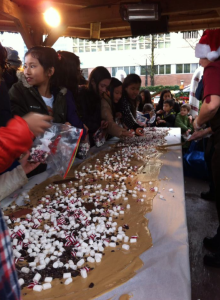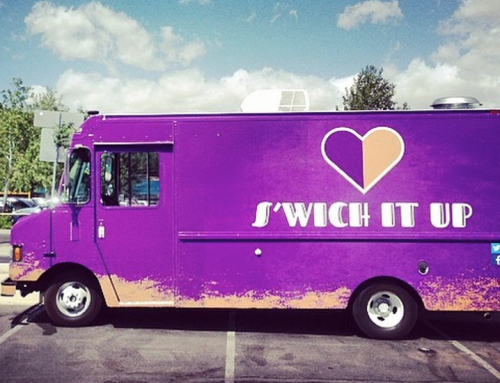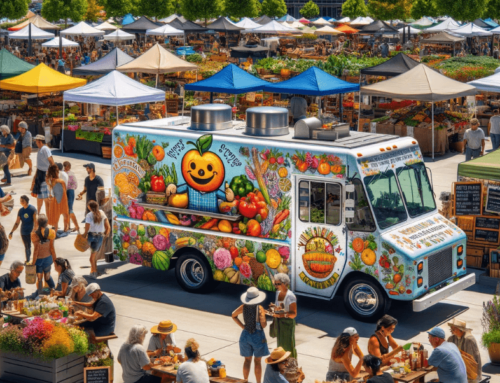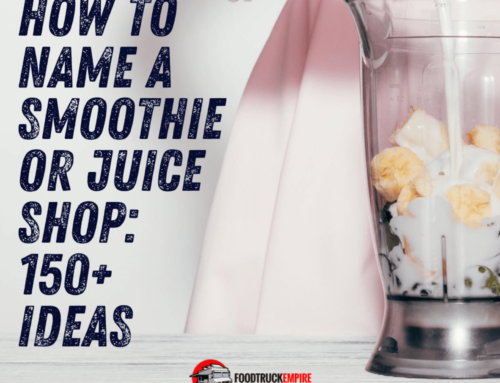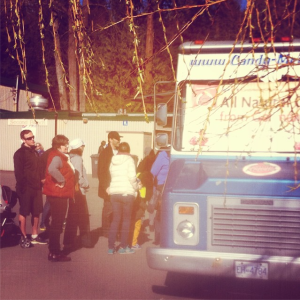 Let’s take a break from the usual and jump across the border. Yes, it’s not only US cities that have gathered the food truck trend; nor are they the only ones with new owners in the mobile game that may be looking for some guidance in their new jobs. In which case, we thought we’d take a look into one of our neighbors to the north; in particular, one of the big cultural and culinary capitals, Vancouver.
Let’s take a break from the usual and jump across the border. Yes, it’s not only US cities that have gathered the food truck trend; nor are they the only ones with new owners in the mobile game that may be looking for some guidance in their new jobs. In which case, we thought we’d take a look into one of our neighbors to the north; in particular, one of the big cultural and culinary capitals, Vancouver.
Despite the chill, the city has accrued quite the following, not only in those loving the new food truck trend but in business owners trying to get in on the ideas. Plenty of vendors have hit the street, starting their own groups and setting up events and rallies.
But as with any city, there’s a personality and culture developing in its food truck world that one needs to be aware of before entering. The cold isn’t the only obstacle to get around, and the love of food not the only benefit. Our guide to discover this today is the Candy Meister Van, owned by Max, Elisa, and Henning Wehke. They’ve graciously taken the time to open up to us about their particular scene.
Question: Tell me a bit about yourself, your business, and how long you’ve been operating in your city.
We, Max, Elisa and Henning, are three friends from Berlin (Germany) who are running the Candy Meister Business. Max started our candy business as a university project at the Vancouver Christmas market in 2012. After the great success at the Christmas market Max had the idea to start an actual company in Vancouver which is focusing on importing traditional, all natural, corn syrup free and non GMO candies from Germany with gluten free, dairy free and vegan options. Max is the CEO and taking care of our producers and shipping. Elisa is our creative part. She is doing all the art work for our truck, social media pages and our packaging. I am in charge of marketing and sales and in charge of contacting local stores if they are interested in selling our candies in their stores.
I joined the company in summer 2013 and went to Vancouver with Elisa (Max fiancee) to manage the construction of our food truck and to get the business started. We decided to get a food truck instead of renting a store front, because we preferred to be mobile and to be able to go to different events instead of paying a monthly rent for a store. The long term plan was to raise awareness for our natural candy brand Candy Meister with the truck to be able to get our products into retail stores and bigger chains.
In 2013 we were just selling our candies at events and night markets, because it took quite a while to get our truck insured and to be able to get all the permits to actually be able to sell on the streets.
2014 was our first “real” season after getting all the permits. Sadly the city of Vancouver decided to not give out any new permits for downtown in 2014 because of bylaw changes, which was a huge downer for us. Gladly we were able to get a great spot at second beach at Stanley Park from Parks Vancouver. It was the first year they allowed selected vendors to sell at their beaches and parks. 2014 was a great year for us. Our candies got more and more fans and we got a lot of attention by the people of Vancouver and the media, because nobody ever saw a candy truck before. And the quality and flavors of our candies are outstanding.
Beginning of 2014 we started to contact local stores (or they contacted us) to get our products in their stores. The feedback was fantastic. Currently we are in over 30 stores in Canada and the US plus chains like safe on foods are starting to sell our products. At the end of 2014 we hired the sales Agency New Age Marketing who is taking care of our bigger accounts like HY Louie and Overweitea Foods and our distributors UNFI and Christmas.
Q: What’s the Food Truck scene like in Vancouver, and how have you been navigating it?
The food truck scene in Vancouver is growing and growing. But there are also a lot of trucks for sale because business is not as easy as everybody thinks. There is a food truck association where food vendors help each other and organize events like the food truck fest. I don’t know how the regulations are to get accepted in the association. We didn’t get accepted because we import our candies and don’t produce anything our self. Beside this most of the food truck vendors are nice to each other and are happy to help with tips for events.
Q: What are the main regulations and health codes that we need to be aware of, are there any that may be/are hindering food trucks and/or development in the city?
The problem in Vancouver is that the city has problems to find fair regulations regarding downtown licences. Every downtown vendor gets his own spot, but the city just announced that like in 2014 there will be no new licences for 2015. They have problems to change the bylaw. Some vendors own more than one spot and renting them to other vendors or they just don’t use them to keep the competition down.
The city of Vancouver (not downtown) is the only city in the greater Vancouver areas which allow mobile vendors to sell on the streets. In cities like Richmond, Burnaby or North Vancouver it is just allowed to sell at special events or on private property like a parking lot of a supermarket.
The health regulations for a food business also depend on the city where the vendors commissary is based. Different city means different regulations. Vancouver itself seems to have the most strict regulations. The regulations depend on the risk group of the food. Our hard candies are the lowest group, because they can’t go bad.
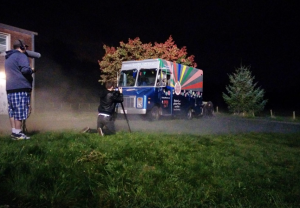 Q: Now, we’ve done quite a few other How To articles on the site, and almost all of them are for cities in the US. Are there any notable differences to Food Truck scenes, regulations, habits/tendencies, etc in Canada as opposed, or maybe in Vancouver particularly?
Q: Now, we’ve done quite a few other How To articles on the site, and almost all of them are for cities in the US. Are there any notable differences to Food Truck scenes, regulations, habits/tendencies, etc in Canada as opposed, or maybe in Vancouver particularly?
I am not sure about the regulations in the US, so it’s hard to tell the differences. I think food trucks are fairly new to Canada. The cities are still in the process of creating regulations and laws to be able to handle this kind of business. The biggest problems are local stores who feel that the trucks have an advantage because they don’t have the costs of a storefront. They want to be protected by regulations so that trucks can’t park close to their stores and steal their business.
Q: Are there any unique advantages or opportunities to working in Vancouver, strategies that work well with the local population?
I think the good thing in Vancouver is that people are interested in new things and trends. They are happy to try new food creations and they are happy to share your business if they like what you are doing.
Q: What would the local difficulties be?
Not many busy places to sell on the streets and at farmers markets due to the different regulations of some cities
Q: Vancouver’s got quite the Cold Climate affections throughout the year, how does that impact truck business? What ways have people developed to combat, or even work WITH, the temperature?
Vancouver is not getting really cold (barely below 0°C), but except in the 4 or 5 month in summer it rains quite a lot. This means the main season for food trucks is very short. We were also selling natural locally made Popsicles in summer and we were thinking about selling hot beverages in winter to get more business.
Q: What’s the parking situation like? Do you need a special permit to park or is it a free for all, how easy is it to find, and would you suggest any particular areas to start focusing on?
Parking and selling on the street is just allowed in the city of Vancouver itself, which means there are not many spots. If you sell on the street you have to feed the meter. Two meters if you have a big truck which takes more space.
Life would be much easier if I would have ideas for great areas to focus on. Finding a good spot is probably the biggest pain every day.
Q: Are there any websites or other resources you would suggest for interested Truck/Mobile owners to look into before beginning? Finally, if you could give only one piece of advice for new food truck entrepreneurs, what would it be?
I would suggest to check http://streetfoodapp.com/vancouver to see if somebody else is selling already the same kind of food. I would also suggest to talk to other vendors and calculate twice and very pessimistic before getting into the food truck business and spend 50.000 to 100.000 CAD for a truck. There are already a lot of trucks on the streets and I don’t think many of them are making a lot of money. You have to have a unique product and a unique looking truck to get a spot from the city, to get into events or to get booked for catering.
HELPFUL READING MATERIAL
Streetfood Vancouver Society – the particular truck association mentioned earlier, non-profit
Food Cart Fest – a weekly summer festival of over 20 trucks, a good organization to try and connect with to get your event schedule needs in place
Vancouver Permit Pages #1 and #2 – a list of qualifications, fees, application, etc.
As usual, we hope this little post has helped new owners to start navigating their city, or perhaps encourage you to look towards Vancouver as an interesting new business option. Thanks once more go to the Wehke’s and their assistance in this department. We wish all the best of luck for them and you in the future to come.

